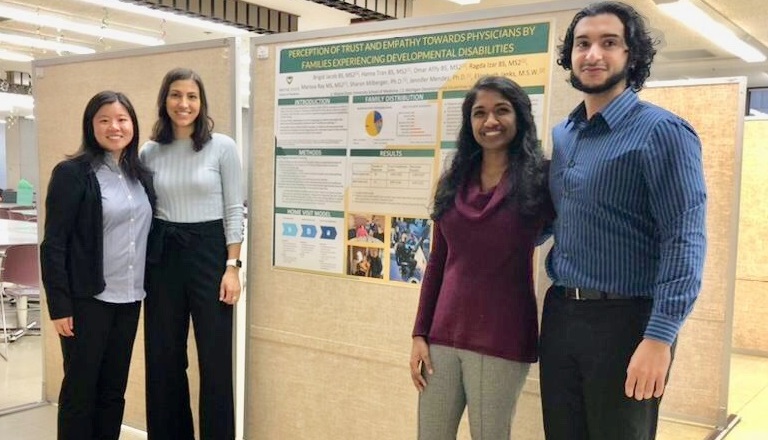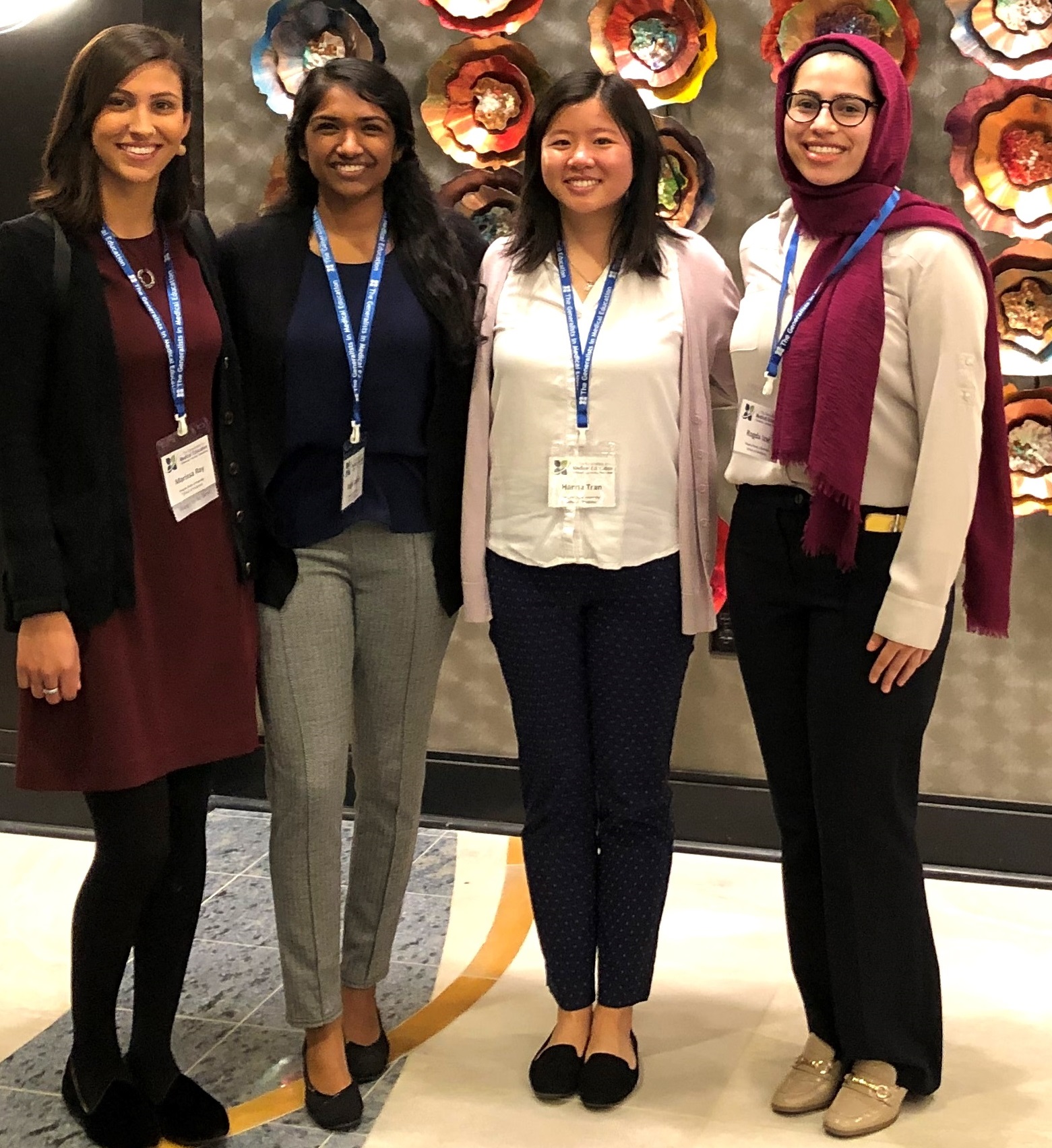Study proves importance of learning care for patients with developmental disabilities through collaborative program at Wayne State

Results of a data analysis led by a team of students, faculty and staff at the Wayne State University School of Medicine reveal that patients and families experiencing developmental disabilities lack trust in physicians due to negative experiences in health care.
To combat that sentiment, medical students participating in an ongoing program administered by the School of Medicine’s ARIE student organization through a grant provided to the Michigan Developmental Disabilities Institute at Wayne State University, are educating physicians-in-training how to effectively communicate with, and diagnose patients, with development disabilities.
Since 2016, medical students volunteering with ARIE have been meeting and learning from these patients and their families’ experiences through home visits, guided by standardized interview questions and surveys about families’ trust in physicians. They have also hosted year-end parties for patients and their families. (Visits were held virtually for a time due to the COVID-19 pandemic).
The collected study data focused on trust families felt toward physicians, as well attitudes of medical students in caring for persons with disabilities.

Arie's then co-coordinators, from left, Marissa Ray, Brigid Jacob, Hanna Tran and Ragda Izar.
Brigid Jacob, who joined ARIE in her first year of medical school, led efforts to publish the study, “Medical student program to learn from families experiencing developmental disabilities,” now available in the International Journal of Developmental Disabilities.
Jacob is one of 307 members of the Class of 2022 who graduated at the School of Medicine’s Commencement and Hooding Ceremony on June 7. She begins her Internal Medicine residency at Henry Ford Hospital in Detroit next month.
When Jacob started clinical rotations in her third year of medical school, she noticed that physicians who actively sought to learn about and understand their patients with disabilities did so on their own.
“I did not come across any standardized training in treating patients with disabilities while on my rotations,” she said. “The Wayne State University School of Medicine is unique in allowing learning opportunities to interact with and learn from this patient population through the ARIE program and in its annual P4 seminar on disabilities.”
P4, or Population, Patient, Physician and Professionalism, is a Year 1-to-Year 2 segment that emphasizes the evolving professional identity of a physician connected to patients and populations.
Developmental disabilities include conditions impairing physical, learning, language, or behavior areas beginning during the developmental period and impacting daily functioning.
Jacob was a co-coordinator for ARIE in her first and second years at the School of Medicine.
“The ARIE program has taught me to listen, to understand rather than to reply, and to work toward building inclusive, safe environments. As I start residency in a few weeks, I will carry this with me as I seek to understand my patients and form trusting relationships with them. If we seek to holistically treat patients as persons beyond just their illnesses, we must make efforts to learn about our patients as such,” she said.
Her co-coordinators then included study co-authors Ragda Izar, Hanna Tran and Omar Afify. The team also included WSU librarian Katherine Akers; Associate Director, Academic, of Diversity and Inclusion Anil Aranha, Ph.D.; and Associate Professor Emeritus Jennifer Mendez, Ph.D., who mentored the ARIE student organization.
Jacob joined ARIE because her close childhood friend’s sister has a disability.
“I observed and heard about the family’s experiences navigating day-to-day activities and special occasions through many years, particularly with handling institutions and other people’s perceptions of them,” Jacob said. “As a future physician, I wanted to make every effort to learn tools to make every patient feel welcomed, safe and cared for to establish strong physician-patient relationships. These efforts were especially important to me for families who experienced developmental disabilities because of my friend’s experiences growing up.”
Survey data from the published study showed that families did not appear to strongly trust physicians, with no significant changes after the program, which study team member Elizabeth Janks, LMSW, said aligns with conversations she has with families as associate director for Training and Education at the Michigan Developmental Disabilities Institute. She provided program evaluation data from families that participated in the project.
The evaluation questions asked if participants believed the ARIE project was of value to them, and if they believed their time spent with the medical students could provide positive outcomes on future physicians working with children with intellectual and developmental disabilities. Families shared that they want future physicians to be empathetic and informed when treating children with disabilities.
Janks is also project director for the Michigan Department of Health and Human Services CDC Health Promotion project, and developed a disability training program for health care workers associated with MI-DDI’s Michigan Vaccination Partners statewide project. She is also a licensed social worker and a parent to a young man with intellectual disabilities, she said.
“The parents overall enjoy the time they spend with the medical students. The medical students try to make the visits engaging and fun for the children. In addition, they provide resources and small gifts for the children in the family. The parents/caregivers indicate that they like helping the medical students learn about the stresses and challenges families have when caring for a child with disabilities,” Janks said.
Implementing a service-learning model like ARIE, with training in communication techniques and home visits in medical schools, can equip future physicians with comfort and confidence when interacting with this patient population, the study said. Learning health care experiences from families during home visits and communication techniques from experts can impact students’ attitudes toward treating patients with developmental disabilities. These aspects may help foster the empathy and knowledge concerning patients with disabilities that families desire in future physicians.
“Participating in the ARIE home visit program described in the publication was eye-opening for me, to hear about diverse experiences of families experiencing developmental disabilities. I enjoyed getting to know the family I was paired up with in the program, and hearing about my fellow classmates’ experiences in the program, too,” Jacob said.
The program was supported by Wayne State University School of Medicine Alumni Association and the Michigan Developmental Disabilities Institute.
The grant from MI-DDI was awarded by its Health Resources and Services Administration from July 2016 through June 2021 for Leadership Education in Neurodevelopmental and Other Related Disabilities, number T73MC30119.